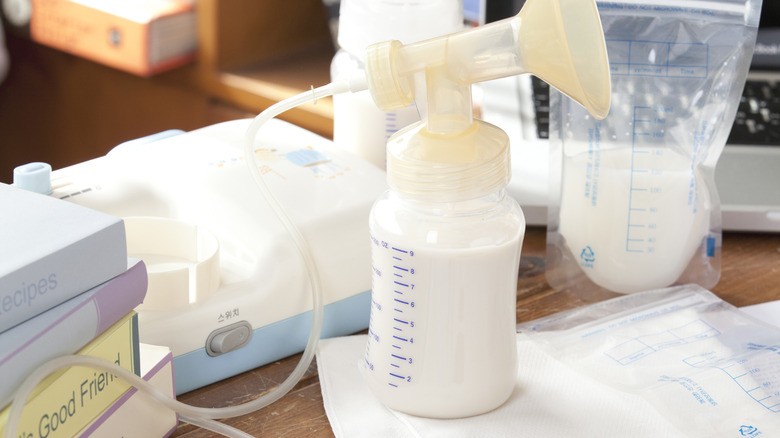How To Store Breast Milk The Right Way
Feeding your baby with breast milk can feel stressful at times, especially if you're going back to work or want your baby to take a bottle from another caregiver. Expressing, storing, and using breast milk in the safest ways possible can be confusing, but it doesn't need to be.
In 2018, 83.9% of U.S. infants were breastfed at some point on average, with that number steadily declining to 56.7% at six months and 35% at one year of age (via Centers for Disease Control and Prevention). The American Academy of Pediatrics recommends exclusively breastfeeding for the first six months of life and continuing, with the addition of solid foods, until at least the baby's first birthday. Breastfeeding has many benefits for babies, including protection against infections, a lower risk of Sudden Infant Death Syndrome (SIDS), better survival rates in the first year, emotional benefits, and the potentially reduced risk of certain allergies, asthma, obesity, and type 2 diabetes (via National Institutes of Health).
It is common for breastfeeding mothers to pump out or express milk for their babies to drink at a later time. If you choose to express milk, it's important to know how to safely store and use breast milk to maintain the highest quality possible.
The rules of breast milk storage and use
Be sure to always start with clean hands before expressing or handling breast milk (via Mayo Clinic). Freshly expressed milk should always be kept in BPA-free containers, such as breast milk storage bags or capped glass containers. When storing in the refrigerator or freezer, be sure to label your containers with the date it was expressed.
Breast milk left out at room temperature should be used within four hours, and it can be stored in an insulated cooler for up to one day (via Mayo Clinic). In the fridge, it's best to use it within three days, though it can be kept for four. If you freeze milk, it should be used within six months, but can be stored for up to one year. Always pay attention to the dates and use the oldest milk first. Research shows that the longer milk is stored, the more vitamin C it loses. Also, milk is produced for what your baby needs at that stage of life, so using milk expressed for a newborn will be different from the milk being produced six months later.
Thawing breast milk properly is just as important as storing it properly (via Mayo Clinic). Frozen milk can be placed in the fridge overnight, or it can be placed in warm water. Thawing milk too quickly, like in a microwave or on a stovetop, can cause uneven heating and can affect the antibodies in the milk. Keep calm and pump on!


